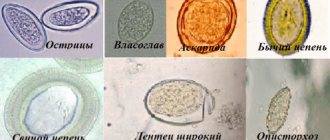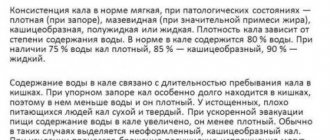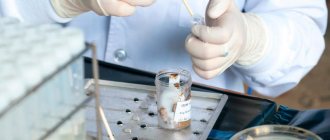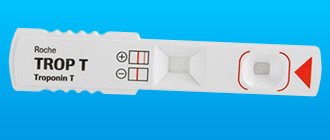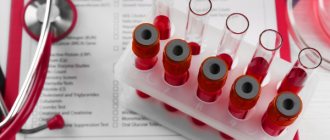Parameters of biochemical examination of stool
Biochemical studies of the sample screen for the following indicators:
- the level of bilirubin, urobilin, stercobilin and the amount of soluble protein;
- pH level;
- examination of stool for intestinal enzymes;
- detection of occult blood in the test stool sample.
Determination of the level of bilirubin, urobilin, stercobilin and the amount of soluble protein in feces
Biochemical examination of stool is used to diagnose hidden bleeding from the gastrointestinal tract that occurs due to peptic ulcer disease or the presence of tumor processes. To do this, determine the amount of bilirubin.
Since bilirubin is a breakdown product of hemoglobin, its increased amount indicates the presence of hidden bleeding or impaired liver function to utilize hemoglobin half-life products. Also, bilirubin in the large intestine is converted by intestinal microflora to stercobilin, which gives stool its characteristic brown tint.
If the amount of stercobilin is reduced and bilirubin is increased, this may be caused by a violation of the intestinal microflora (dysbacteriosis). If a fraction of soluble proteins is present in the sample, this indicates the presence of inflammation of the intestinal walls.
Acidity study
The acidity of feces in a healthy person eating a balanced diet is in the neutral or slightly alkaline range. A significant increase in stool acidity may be due to the presence of gallstones or pancreatitis.
A strong shift in acidity to the alkaline side indicates decreased secretory function of the stomach (gastritis), colitis or pancreatic dysfunction.
Examination of stool for intestinal enzymes
Examination of stool for enzymes makes it possible to assess the functional activity of various organs of the gastrointestinal tract. Deviations from the norm are observed in the presence of the following pathologies:
- pancreatic diseases;
- pancreas injuries;
- gallstones;
- jaundice.
The study of enzymes in feces is carried out using the enzyme immunoassay method.
Determination of occult blood in stool
Normally, there should be no hidden blood in the stool. Its presence indicates bleeding in various parts of the gastrointestinal tract (usually in the lower ones).
The presence of occult blood in the stool suggests:
- peptic ulcer of the stomach and duodenum;
- colorectal cancer;
- intestinal tumors;
- intestinal tuberculosis;
- ulcerative colitis;
- helminth infestations.
A false positive diagnosis of occult blood is possible in case of consumption of hemoglobin-containing products of animal origin (large amounts of meat food or blood sausage). Therefore, it is recommended to exclude these products two days before the analysis.
Biochemistry
Urea
1-2 days before the study, you must follow a diet: stop eating foods rich in purines - liver, kidneys, and also limit meat, fish, coffee, tea in your diet as much as possible. Intense physical activity is contraindicated.
Cholesterol, lipoproteins
Two weeks before the study, it is necessary to discontinue drugs that lower blood lipid levels, unless the goal is to determine the lipid-lowering effect of therapy with these drugs.
Glucose
When donating blood for glucose (in addition to the basic requirements for preparing for tests), you should not brush your teeth, chew gum, or drink tea/coffee (even unsweetened). A morning cup of coffee will dramatically change your glucose levels. Contraceptives, diuretics and other medications also have an effect.
Glucose tolerance test
It is carried out only if there are preliminary results of determining glucose on an empty stomach, without load. The glucose content in blood plasma is determined on an empty stomach and 2 hours after a glucose load.
It is necessary to follow a normal diet (with a carbohydrate content of more than 125-150 g per day) and adhere to the usual physical activity for three days before the study. The study is carried out in the morning on an empty stomach after an overnight fast for 12-16 hours (during this time you should not smoke or drink alcohol).
During the study, the patient should lie or sit quietly, not smoke, not be overcooled, and not engage in physical activity.
It is not recommended to conduct research after and during stress, after operations and childbirth, during inflammatory processes, alcoholic cirrhosis of the liver, hepatitis, during menstruation, and in gastrointestinal diseases with impaired glucose absorption.
Before the test, it is necessary to exclude medical procedures and medications (adrenaline, glucocorticoids, contraceptives, caffeine, thiazide diuretics, psychotropic drugs and antidepressants).
Discontinuation of medications is carried out only after preliminary consultation of the patient with a doctor.
for CHILDREN UNDER 14 YEARS OLD .
PREGNANT women are recommended to carry out a glucose tolerance test at 24-28 weeks, this allows identifying women with gestational diabetes with an accuracy of 98%.
Haptoglobin
Before the study, it is necessary to exclude the use of drugs: dapsone, methyldopa, sulfasalazine, estrogens, oral contraceptives, tamoxifen, androgens.
Alpha-2-macroglobulin
You must abstain from meat for three days before the test.
FibroTest, FibroMax, SteatoScreen
Blood sampling is carried out strictly on an empty stomach in the morning. It is not recommended to take ascorbic acid 1-2 days before the test; it is also necessary to exclude medications and foods that cause artificial coloration of the serum (carrots, oranges).
To conduct a FibroMax study, you must indicate your exact weight and height.
How to take material for biochemical analysis of stool
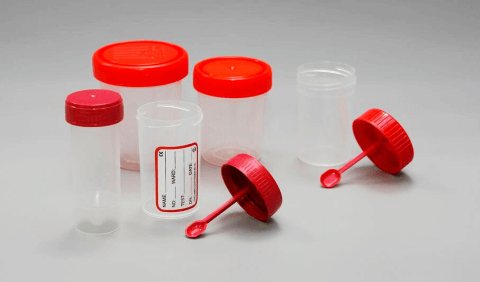
To collect stool, you need to empty your bowels into a sterile container - this can be a bedpan or a regular chamber pot, which should be pre-disinfected.
You need to make sure that urine does not get into the stool, so before collecting the analysis it is better to urinate in the toilet. Then the feces are collected in a sterile container, approximately ⅓ the size of the container.
The material must be delivered to the laboratory within 3 hours. Stool should be stored in the refrigerator.
Test results: normal or pathological?
After the study, the laboratory issues a form with the obtained indicators and their normal values for comparison. The results of stool analysis for the intestinal group additionally indicate the sensitivity of the microflora to antibiotics and phages. The norms of coprogram in children and men/women are presented in the table.
| Index | In children | In adults |
| Amount of feces | 40-50 g/day (infants) 100-250 g/day | 100-250 g/day |
| Consistency | Putty-like | Soft |
| Color | Yellow-brown | Light brown |
| Smell | Sour, fecal | fecal |
| pH | 4,8-6,0 | 7,0-7,5 |
| Ammonia | 20-40 mmol/kg | 20-40 mmol/kg |
| Leukocytes | Single in p/zr | Up to 8-10 p/zr |
Our clinic specialists explain to patients in detail what this or that result shows. They give recommendations on further treatment and diet, and, if necessary, prescribe consultations with other doctors. Our clinic, operating with the support of the medical laboratory Gemotest, where paid stool tests can be done in a short time and at a low price, is located at the address: Eastern Administrative District, Perovo metro station, Perovskaya street 22, building 1.
Individual consultation
Preparing for analysis
To improve the quality of diagnostics, you should follow simple rules:
- Limit food from the diet two days before collecting a sample that can significantly affect the results of a biochemical analysis of stool. You should avoid eating protein foods, especially those containing hemoglobin. Reduce the amount of yeast flour products (fermentation affects both pH and enzyme composition).
- Unless absolutely necessary, do not take drugs that affect the intestinal microflora or enzyme-containing drugs.
- Avoid pigmented foods (beets, tomatoes, etc.) two days before the test;
- Eliminate excess fat in food;
- Avoid various pickles, pickled and smoked foods;
The best diet for high-quality diagnosis would be a diet based on vegetables, fruits, cereals and dairy products.
Hormones
Blood for hormonal studies must be donated on an empty stomach in the morning. If this is not possible, blood can be donated for some hormones 4-5 hours after the last meal in the daytime/evening hours (except for those studies for which blood must be donated strictly in the morning). 1-2 days before the test, exclude high-fat foods from the diet; the last meal should not be large. 1 day before the study, psycho-emotional and physical comfort (calm state without overheating and hypothermia) is necessary.
Thyroid hormones
During the initial check of thyroid hormone levels, discontinue medications that affect thyroid function 2-4 weeks before the test (after consultation with your doctor). When monitoring treatment, exclude taking medications on the day of the study and be sure to note this on the referral form (also note information about taking other medications - aspirin, tranquilizers, corticosteroids, oral contraceptives).
Sex hormones
In women of reproductive age, the results of hormonal studies are influenced by physiological factors associated with the phase of the menstrual cycle. When examining sex hormones, indicate the phase of the menstrual cycle. Hormones of the reproductive system must be taken strictly on the days of the cycle:
- LH, FSH – 3-5 days of the cycle;
- Estradiol – 5-7 or 21-23 days of the cycle;
- Progesterone – 21-23 days of the cycle;
- 17-OH-progesterone, DHA sulfate, testosterone – days 7-9;
- Prolactin - donate blood in the morning at rest; before the study, exclude palpation of the mammary glands.
Anti-Mullerian hormone (AMH/MIS), Inhibin B
For women, the study is carried out on days 3-5 of the menstrual cycle. 3 days before taking blood, avoid intense sports training. The study should not be performed during any acute illness. Do not smoke 1 hour before taking blood.
Adrenaline and norepinephrine
8 days before the study, exclude medications: salicylates, β-blockers. 1 day before the test, you must refrain from heavy physical activity, exclude alcohol, coffee, tea, B vitamins, and bananas.
Renin, angiotensin
Before the study, exclude the use of estrogens (1-2 months before), diuretics (3 weeks before), and antihypertensive drugs (one week before). Blood collection should be carried out in a sitting or standing position.
Aldosterone
In consultation with your doctor, 8 days before the study, discontinue antihypertensive drugs, β-blockers, laxatives, corticosteroids, diuretics, and antidepressants. 3 weeks before the study, discontinue aldosterone antagonists.
ACTH, cortisol
Due to the fact that ACTH and cortisol are stress hormones, you need to calm down and relax for 20 minutes before donating blood. Any stress causes an unmotivated release of these hormones into the blood, which will lead to an increase in this indicator. The level of these hormones changes cyclically throughout the day, so the most informative results are studies conducted in the morning before 9 o’clock.
Insulin, C-peptide
Donate blood strictly in the morning.
Gastrin 17, Gastrin-17 stimulated, pepsinogen I, pepsinogen II, H. Pylori IgG
Blood must be donated for testing on an empty stomach after a 12-hour fast. 1 week before the study, refrain from taking medications that affect gastric secretion: Pepcedin, Zantac, Nizax, Ranimex, Esofex, Losec, Somac, Ranixal, Ranil. 1 day before the study, refrain from taking medications that neutralize hydrochloric acid secreted by the stomach: Alsucral, Balancid, Prepulsid, Metropam, Librax, Gaviscon. If you have difficulty stopping medications, be sure to inform your doctor. 3 hours before donating blood, refrain from smoking.
When is a referral for analysis issued?
In addition to screening the age group over forty years, the doctor writes a referral for this test in the following cases:
|
|
The analysis reveals the slightest damage to the walls of the intestine. If an admixture of blood higher than normal is detected in the stool, the test is repeated and, if the result is confirmed, the patient is sent to see a proctologist or gastroenterologist.
In what cases is a test for occult blood prescribed?
Taking biomaterial for occult blood is prescribed for the purpose of early diagnosis of tumor processes in the gastrointestinal tract for people over the age of 50 years.
Indications for analysis, regardless of age, are the following cases:
- regularly occurring pain in the abdomen, right and left hypochondrium;
- unpleasant and painful sensations during bowel movements;
- discomfort after bowel movement;
- feeling of pressure and fullness in the rectum;
- indigestion: diarrhea or constipation, the presence of purulent or mucous impurities, foam, blood in the feces;
- decreased or lack of appetite, sudden weight loss;
- often tormenting nausea and vomiting, burning in the sternum and upper abdomen, belching;
- causeless increase in body temperature;
- history of colon or rectal cancer and other gastrointestinal pathologies;
- helminthiasis (detection of damage to the gastrointestinal mucosa).
Immunological blood test: tumor markers
If we talk about what tests show oncology, then this examination is quite informative and allows you to determine the presence of cancer. It is also used to detect relapses after treatment.
Tumor markers are special types of protein, enzymes, or protein breakdown products. They are released either by malignant tissue or by healthy tissue in response to cancer cells. Now the existence of more than 200 species has been scientifically proven.
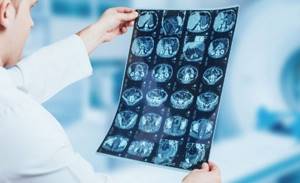
Tumor markers are also present in small quantities in the body of a healthy person; their volume increases moderately, for example, with a cold, as well as in women during pregnancy, and in men with prostate adenoma. However, the appearance of certain specific types in large quantities is characteristic of certain tumors. For example, tumor markers CEA and CA-15-3 can signal breast cancer, and CA 125 and HE-4 can signal ovarian cancer. To obtain the most objective result, it is recommended to be tested for several tumor markers.
By increasing the level of a particular tumor marker, it is possible to determine which organ or system is affected by the tumor. Also, this analysis can show that a person is at risk of developing cancer. For example, in men, an increase in the PSA tumor marker becomes a precursor to prostate cancer.
An immunological test is taken on an empty stomach, blood is taken from a vein. Tumor markers are also determined by urine analysis.
What blood test shows cancer?
Many patients are convinced that it is possible to detect cancer using a blood test. In fact, there are several types of this diagnostic procedure, starting with a general analysis and ending with an analysis for tumor markers. The following types of cancer diagnosis using blood tests with varying degrees of information content are distinguished:
- general analysis;
- biochemical analysis;
- blood clotting test;
- immunological blood test (for tumor markers).
Even if cancer has not yet manifested itself with painful symptoms, negative changes are already occurring in the body, which can be recorded by a blood test. When a malignant tumor grows, it destroys healthy cells that help the body grow and releases toxic substances. These changes are noticeable even with a general blood test, but they can also be a sign of dozens of diseases not related to cancer.
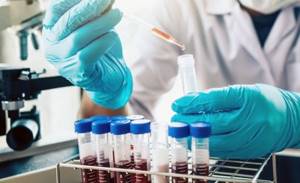
The most informative is considered to be an analysis of tumor markers - specific substances that are released into the blood as a result of the vital activity of tumor cells. However, given that tumor markers are contained in the body of any person, and their number increases during inflammation, this analysis does not 100% prove the presence of cancer. It only becomes a reason to undergo more reliable tests to determine oncology.

